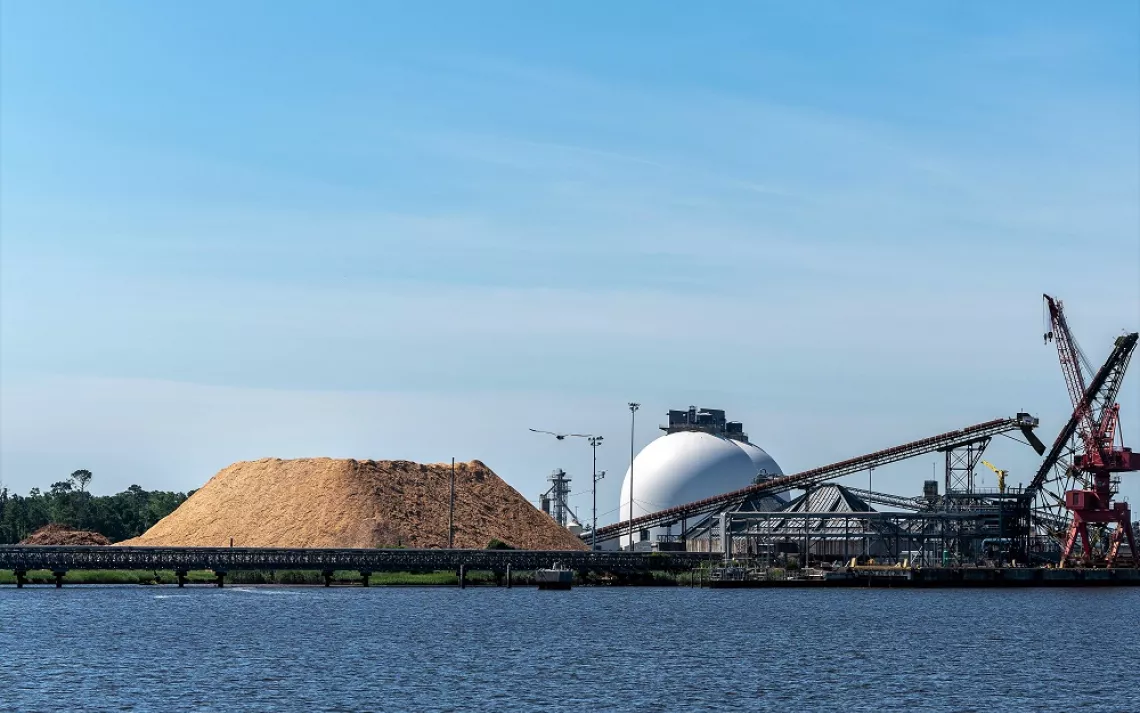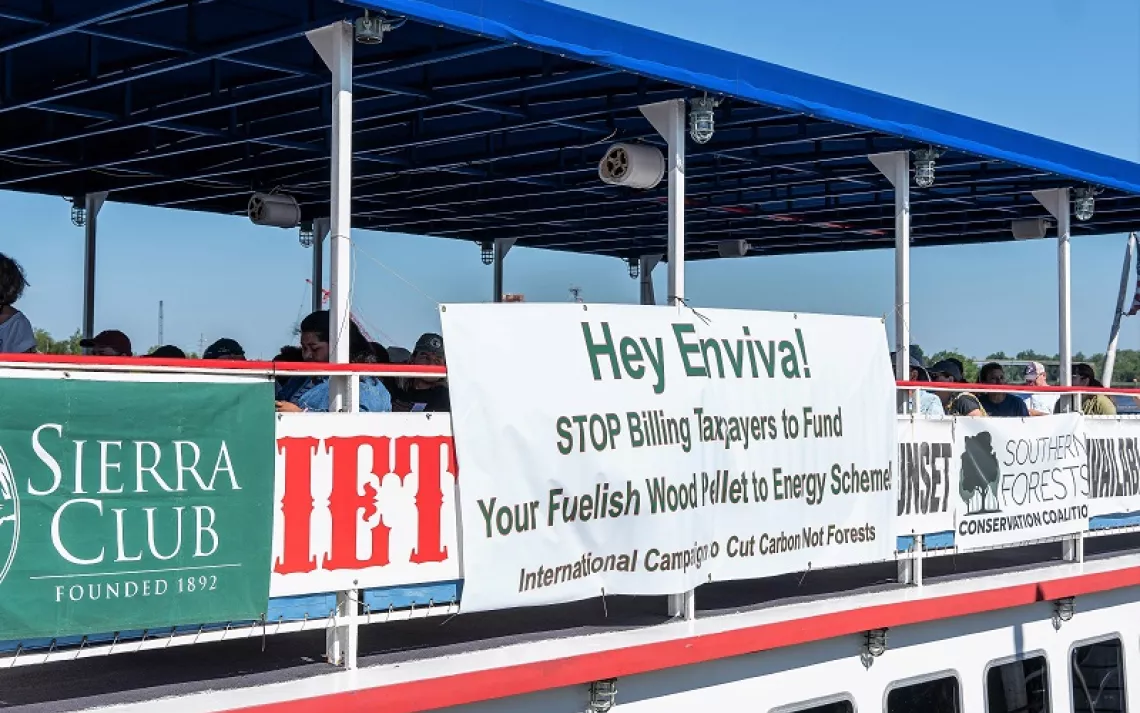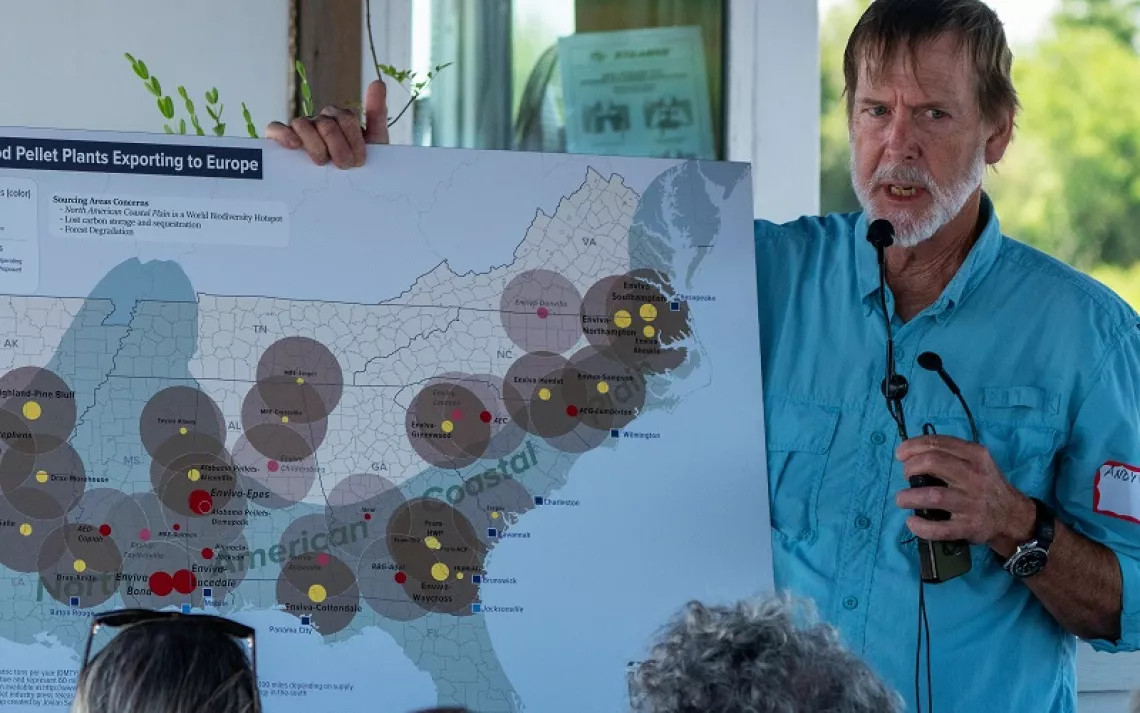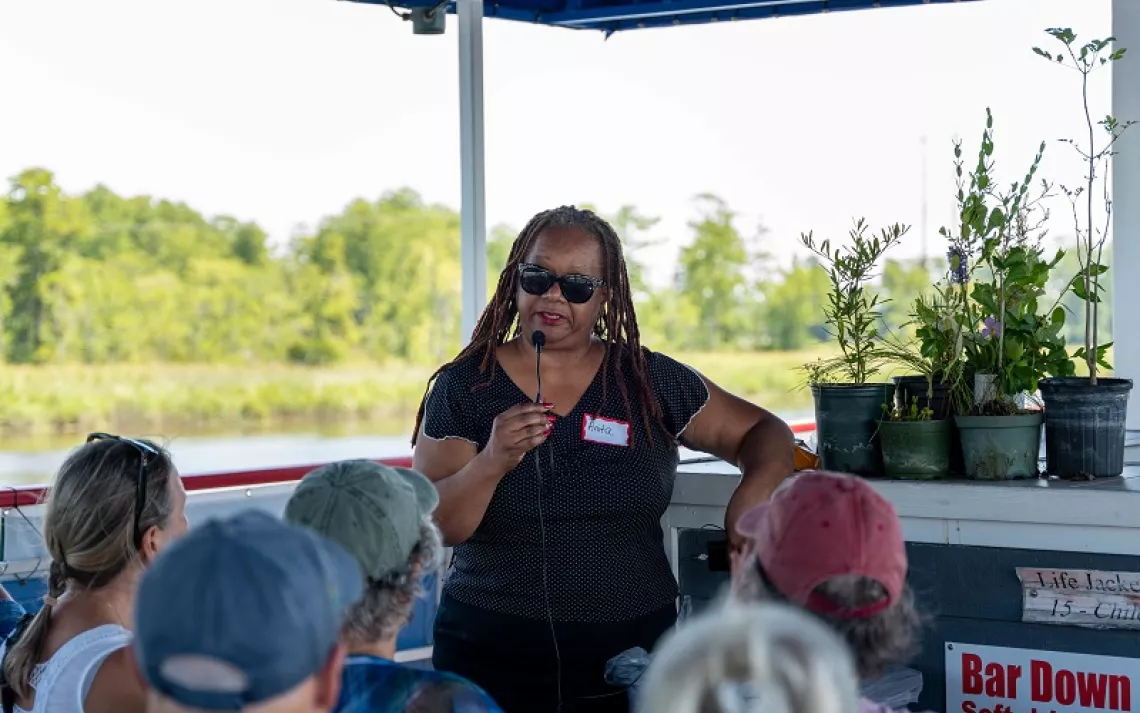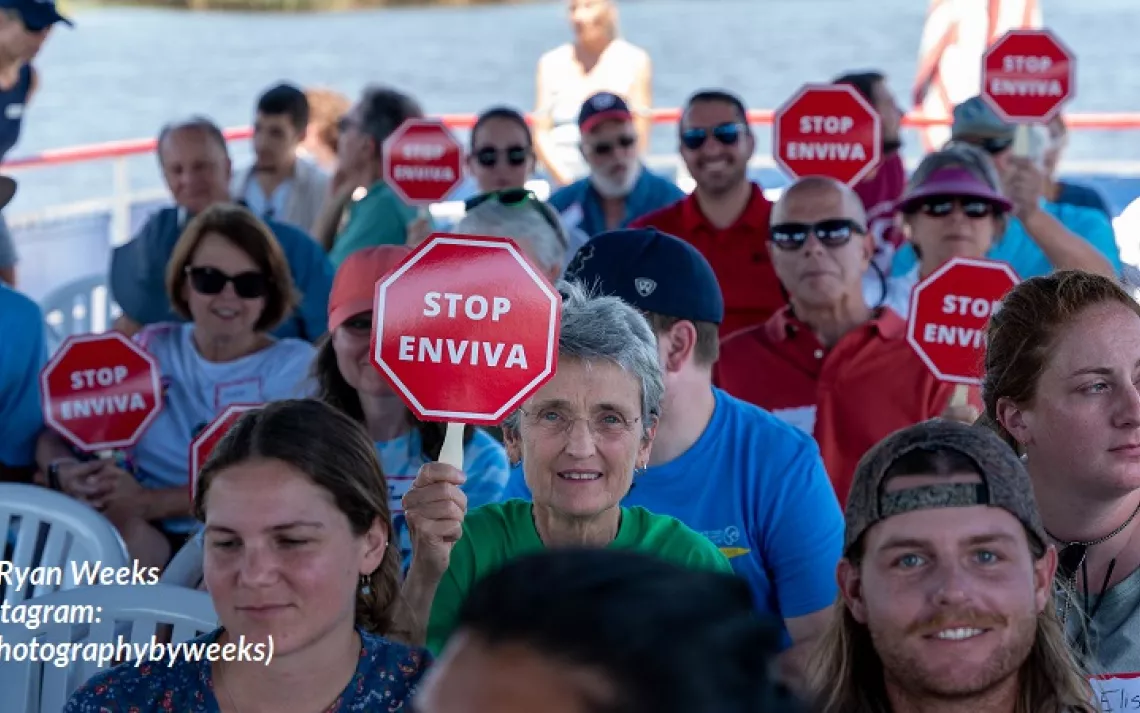By Derrick Galloway
Digital Marketing and Communications Fellow
A scenic summer cruise along the Cape Fear River began with a startling sight: A massive pile of wood pellets along the shore of the Port of Wilmington.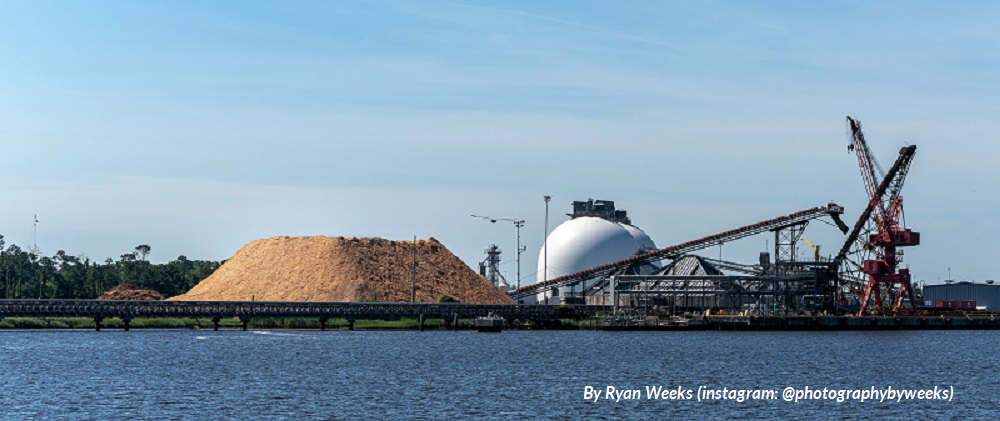
Within minutes of setting out on our trip, we passed the Enviva wood pellet storage and transport facility, our first exhibit on a cruise for environmental activists and citizens. The scene was the first alarm bell in a trip that gave us a glimpse into the damage caused by the wood pellet industry - in North Carolina, and around the world.
“Stop Enviva!” was the title of this cruise on a hot summer Saturday in mid-June. Sponsored by environmental organizations including the N.C Sierra Club and the Southern Forest Conservation Coalition, the cruise carried about 70 people on a two-hour ride along the Cape Fear River.
We learned much about the wood pellet industry and its damaging impacts on both the environment and communities near pellet-making plants in North Carolina, and what citizens like me - and you - can do about it.
Wood pellets, also known as biomass pellets, are made either from by-products of wood processing or, more commonly, from trees cut specifically for pellet production. They are burned in power plants in the United States and overseas, especially in the United Kingdom.
Enviva, an American company that has been around since 2004, is the largest producer of wood pellets in the world. It has multiple facilities in North Carolina and throughout the South.
Enviva's transport location at Wilmington featured two large storage domes, with capacity for 45,000 metric tons of the same wood pellets piled outside. The outdoor pile we saw would be gone by the next evening, our guides said - loaded aboard ships for transport to European power plants.
More pellets would take their place soon enough as overseas customers continue to burn them as a “renewable” and “carbon-neutral” energy source. But the true impact of the industry is not nearly so green.
Recently, there have been efforts in the European Union's Parliament to weaken the wood pellet industry. Those have been blocked by its business committee, which has even opened the possibility of expanding - not limiting - subsidies for wood pellets consumers.
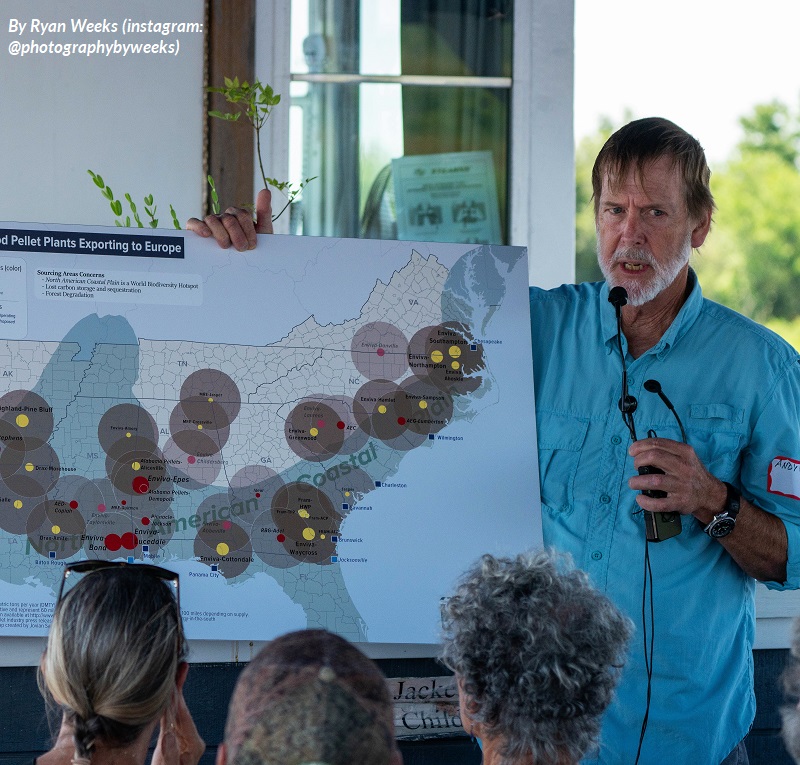 Andy Wood, director of the Coastal Plain Conservation Group (pictured), explained to our party how Enviva and other wood pellet manufacturers target trees in wetland areas, cut those forests with heavy and polluting machinery, then convert them into wood pellets and ship them to customers. But these wetland forests are important carbon sinks that, if uncut, would absorb carbon dioxide from the atmosphere and slow climate change.
Andy Wood, director of the Coastal Plain Conservation Group (pictured), explained to our party how Enviva and other wood pellet manufacturers target trees in wetland areas, cut those forests with heavy and polluting machinery, then convert them into wood pellets and ship them to customers. But these wetland forests are important carbon sinks that, if uncut, would absorb carbon dioxide from the atmosphere and slow climate change.
It's not just wetland forests that are targeted. Any privately owned forest, that Enviva can pay the owners of to cut, is at risk. And though Enviva advertises that it primarily uses wood that cannot be used for other purposes - scraps and branches, for instance - it has been well-documented that the company, in fact, cuts whole trees.
The full process - transportation of the raw wood, shipping of the pellets to customers, and the final act of burning the pellets for fuel - presents environmental hazards from start to finish.
“Not only is the burning of wood pellets less efficient, but even dirtier than burning coal or fossil fuels,” Wood said. “The propelled ships that transport them across the Atlantic burn bunker fossil fuel, which is the dirtiest type of fossil fuel that can be used. A single ship traveling 3,800 nautical miles spews 5,025 tons of CO2 into the atmosphere.”
As we continued along the river, I aimed my camera at an osprey resting in its nest on top of a single, thin, wetland tree. Wood described one of the direct effects of Enviva clearcutting trees for harvesting: the carnage inflicted by the machinery they use.
The heavy, wide machines are designed to trample trees with ease - and take habitats and ecosystems with them. “It is absolute carnage,” he said.
One of the major selling points of wood pellets is that trees are considered a renewable resource, as they can be replanted. But, Wood said, landowners get only a fraction of the replanting cost.
Removing acres and acres of trees also poses a problem during hurricane season, as trees help absorb the impact of storms and intact forests serve to absorb flood waters and prevent flooding downstream.
Once trees are cut, they go to facilities that process them into pellets, which results in air and noise pollution. In our region, communities around these plants are often low-income and largely populated by people of color.
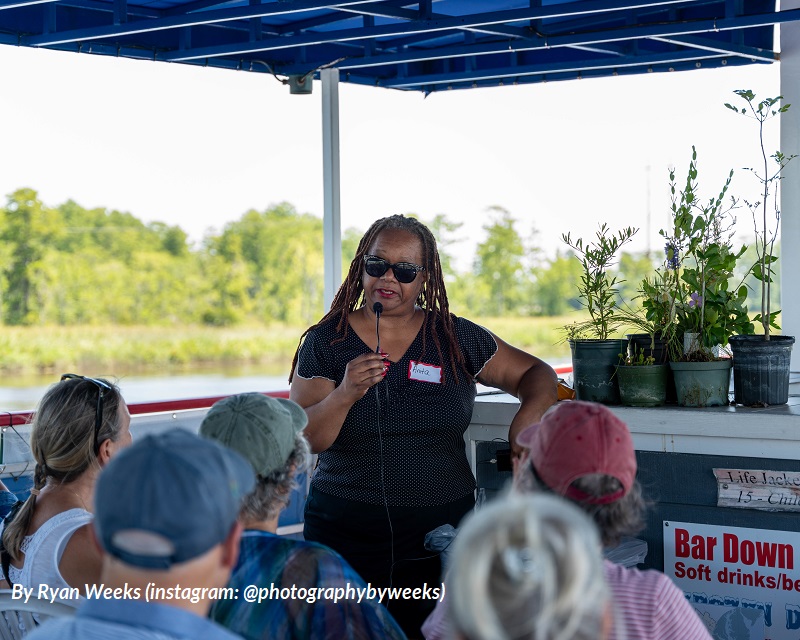 Anita Cunningham, a community leader in Robeson County (pictured), has lived within a mile of a wood pellet plant.
Anita Cunningham, a community leader in Robeson County (pictured), has lived within a mile of a wood pellet plant.
She described how the air is polluted by the process of grinding the wood and steam-pressing it into wood pellets. Particles that are emitted can lead to respiratory issues for those living in the area. People living nearby are often kept awake at night by loud noises coming from the facilities at random - and often lengthy - periods of time.
There is little they feel empowered to do about it, Cunningham said: "Folks feel like they don’t have a voice."
After the cruise, Cunningham told me that some efforts to fight the wood pellet industry have succeeded. A wood pellet plant that was about to begin operations in Robeson County was shut down due to collaborative, persistent community opposition.
Going forward, she said, education and teamwork among communities will be key to fighting future expansion plans, as well as pushing back against the industry's current impacts.
“People need to be aware of the negatives that are affecting their communities," Cunningham said.
At the end of the cruise, our hosts encouraged us all to get involved in fighting this industry in an effective way.
What can you do? Keep an eye on state permitting applications for new wood pellet plants or expansions of existing facilities. Join and volunteer with activist and community groups like the ones linked in this article and in the short list below. Educate yourself about the industry's real impact on the environment, locally and globally - and spread the word among your friends and neighbors through conversations or even a letter to the editor of your local newspaper.
You can also call or write to your elected leaders in your community, state legislature or Congress. Bear in mind that lawmakers typically are more influenced by paper letters and phone calls than emails, often equating one such contact with 50 or more voices in the community.
Ask them to act wherever possible to protect North Carolina’s forests through conservation funding and incentives for private landowners, rather than allowing them to be shipped overseas to be burned.
This cruise on the Cape Fear River, and what I learned before and afterward about the wood pellet industry, showed me vividly how fighting for our environment here at home can be critical for protecting the environment worldwide. By speaking up and standing up against corporations like Enviva where we live, we're working for the greater good of people around the globe.
--------
Here are more North Carolina groups you can join or monitor for news and actions on the wood pellet industry:
